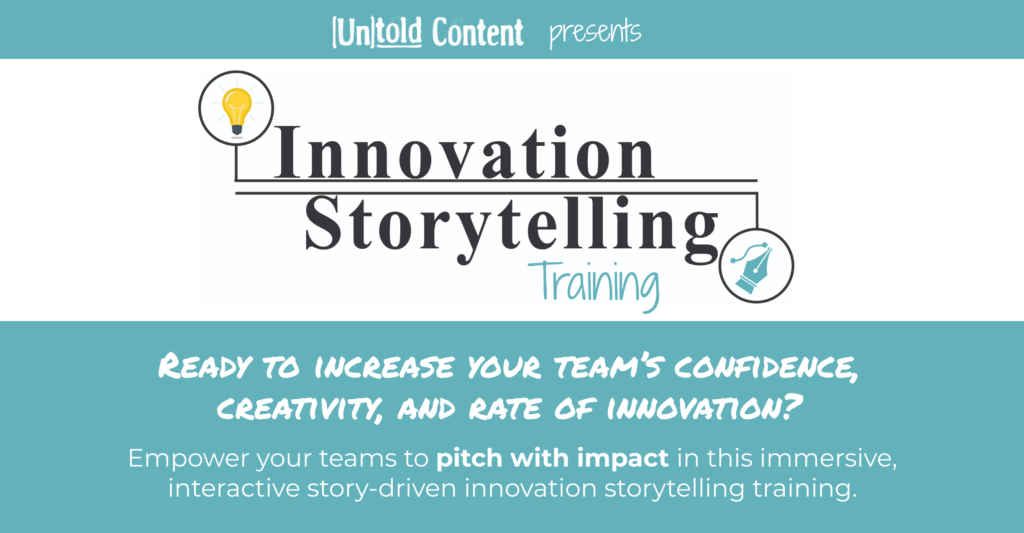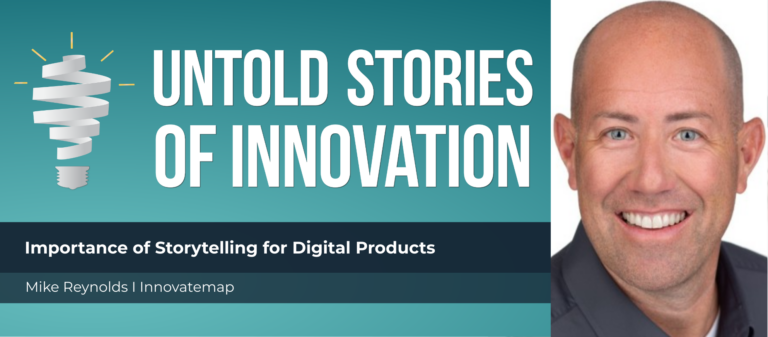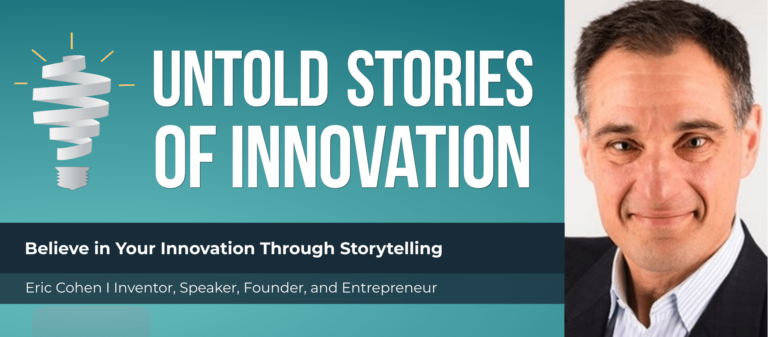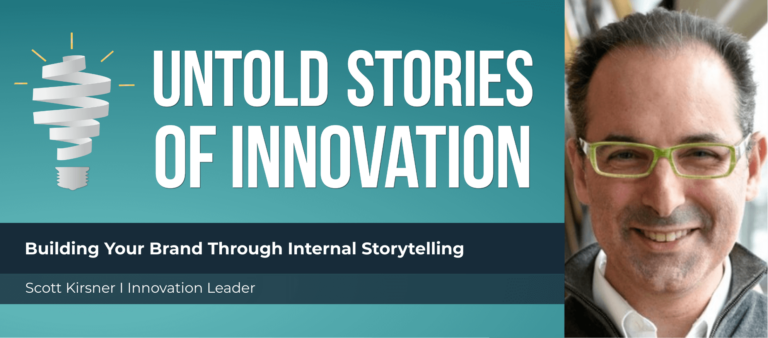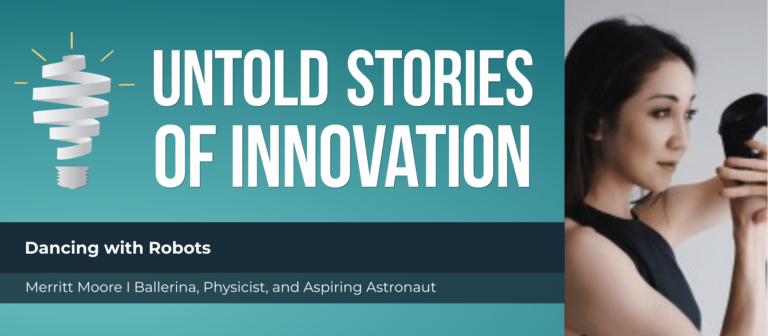Celebrating Diversity Through Story with Chelsie Walter of Women of Cincy
Untold Stories of Innovation
“There is power and strength in diversity. Diversity of race and background, age, gender and all these things that people come to the table with as themselves. They bring their whole selves to the table. It's not just one aspect of them. And we need to figure out, as a city, as a society, as a country: how do we celebrate all the things people are bringing to the table and listen to everybody's lived experiences? Because that's how we create better solutions.” -Chelsie Walter, executive director and co-founder of Women of Cincy
From today’s episode you’ll learn:
Why do stories matter to the innovation process? What values can be instilled in innovators who share stories? How do innovation leaders inspire creators to tell and share their success and failure stories?
We speak with Chelsie Walter, whose passion for storytelling led her to co-found Women of Cincy, a non-profit seeking to amplify the voices of the Cincinnati community to enact positive change. When told through story, housing insecurity, as well as entrepreneurship, can reveal a problem, or simply an unrecognized part, of a region’s identity. In our conversation, we discuss how Women of Cincy puts empathy to work by focusing on change-makers nominated by their own community for their story, their voice, and their outreach. If you know a person you think is a change-maker, nominate them at womenofcincy.org/nominate.
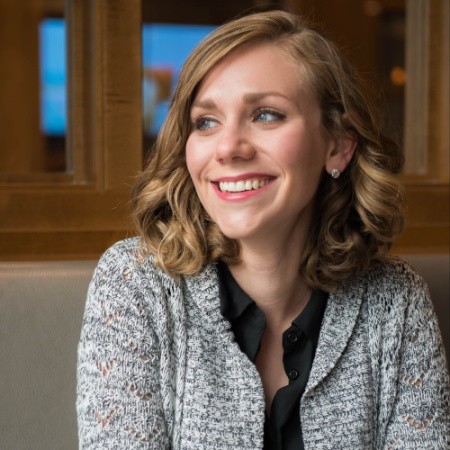
Chelsie Walter is the executive director and co-founder of Women of Cincy. She’s a Cincinnati transplant, DAAP grad, and freelance graphic designer. She’s a passionate storyteller and photographer who loves thrifting, digging through Cincinnati history, and porch sitting (seriously, come over!). She lives with her husband Cody, Goldendoodle Mötley, sugar gliders Luna and Lulu, and way too many plants. Learn more about Chelsie at Women of Cincy and on Facebook, Twitter, LinkedIn, and Instagram.
untoldcontent.com/trainings/innovation-storytelling-training
TRANSCRIPT
This episode is powered by Untold Content’s innovation storytelling training. Increase buy in for your best ideas in this immersive and interactive, story-driven experience. Where your teams refine storytelling techniques for their latest projects, prototypes and pitches—and get inspired by 25 epic examples of impactful innovation stories.
Katie: [00:00:04] Welcome to Untold Stories of Innovation, where we amplify untold stories of insight, impact and innovation. Powered by Untold Content. I’m your host, Katie Trauth Taylor.
Katie: [00:00:20] Our guest today is Chelsie Walter. She is executive director and founder at Women of Cincy. Chelsie, thank you so much for being on the podcast.
Chelsie: [00:00:28] Yeah, thanks for having me.
Katie: [00:00:29] I’m a huge fan of Women of Cincy. Obviously. The context here is that Chelsie and I have been friends for several years as we both formed startups in the Cincinnati region. For Chelsie, it was Women of Cincy. And for me it was Untold.
Katie: [00:00:42] And both of us obviously have a passion and a love for storytelling, which we will definitely get into in our conversation. But tell us about Women of Cincy, Chelsie.
Chelsie: [00:00:51] Yeah, I’d love to. And thanks for having me, by the way. I’m really excited.
Katie: [00:00:54] Yeah. I had to have you on the podcast. Again, Soul Sisters in innovation and storytelling. So this is going to happen. We’re probably going to geek out a lot on this episode.
Chelsie: [00:01:04] I really appreciate it. I hope you do it justice. So Women of Cincy has been around for about three years now, and we are a nonprofit media platform built to awaken and amplify change makers through storytelling, community and mentorship. Those are the three buckets that we operate under. And so basically, we believe that citizens have the power to create a more equitable, inclusive city. Really, that starts with taking control of our narrative and our collective story and understanding and respecting one another on a deeper level, because that’s how we problem-solve. It’s how we move forward. And that’s just how we create stronger communities.
Katie: [00:01:38] I love your mission and your origin story as well. Can you tell us? You know, I’m very familiar. I think a lot of listeners might be already familiar with Women of Cincy. But tell us sort of the types of storytelling that you do.
Chelsie: [00:01:51] It’s all across the map. One kind of cool feature about how Women of Cincy is organized is that all of our feature stories are one hundred percent nomination. So it’s 100 percent community driven. Or you can go onto our site right now if you want to nominate somebody, it’s womenofcincy.org/nominate. And because they’re all nomination based, it means that our storytelling is just a super wide scope. So we’ll interview anybody from stay at home moms, nurses, teachers, women who own multi-million dollar companies, women who are experiencing housing insecurity, female filmmakers, female entrepreneurs, not even always all women. We’re very open about who we tell stories about. We tell everybody’s story. So you don’t have to just identify as a woman.
Chelsie: [00:02:34] But yes, our storytelling really hopefully reflects Cincinnati itself and all the people who are living and we want to thrive in it.
Katie: [00:02:43] I’ve learned about just the incredible diversity of women or women-identifying people in the Cincinnati region through all of your organization’s efforts. And I think so many of us can say that we’ve been sort of changed by seeing and experiencing the lives of other women who have been featured on your site. Tell us about some of your. I know it’s like picking a favorite child. So I don’t mean to ask you to choose a favorite story, but tell us about some of the stories that have really touched you, that have been kind of memorable or that you’ve heard a lot of feedback in the community about.
Chelsie: [00:03:20] I would say off the top of my head, a couple come to mind. Monique Gilliams story is amazing. She’s been through all kinds of stuff. And the amount of just resiliency that that woman has just is mind blowing. So I definitely recommend Monique’s story.
Katie: [00:03:35] Tell us more about it.
Chelsie: [00:03:36] Yes. So Monique Gilliams, she works with families – I think it’s the Family Independence Initiative.
Chelsie: [00:03:42] So she helps families figure out how to kind of budget money and also set their personal goals and just figure out how to move forward as a family and so her stories around that are pretty cool. She’s also had to deal with quite a few just deaths and setbacks and some struggles with housing and just so many issues that she’s been through thrown into.
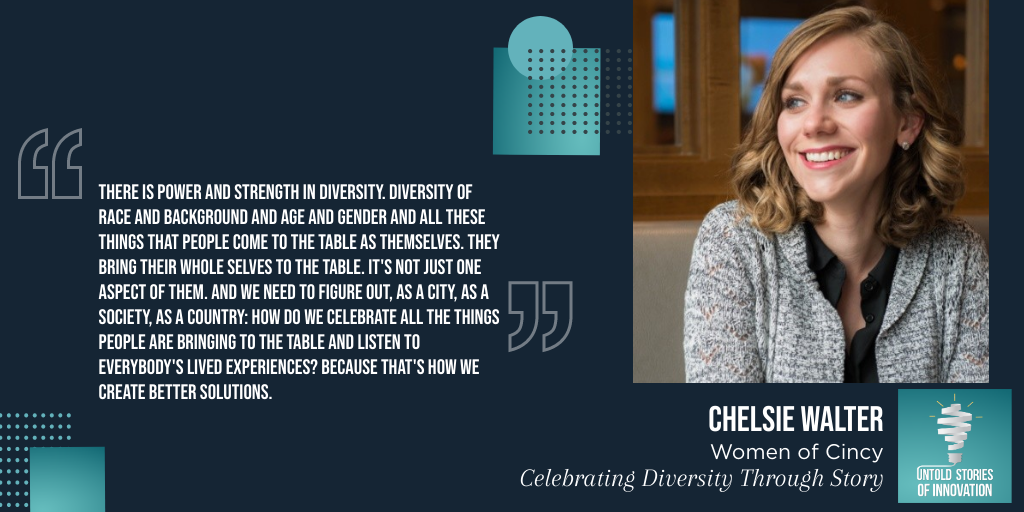
Chelsie: [00:04:03] And she’s just come out on the other end and she’s always just got this fantastic, huge smile on her face. For the most encouraging, uplifting people I’ve ever met in my life, so Monique is a really great one. Lauren Elise is a singer songwriter, same thing. She’s just always just pouring into other people. And she’s been through a lot of ups and downs in her life and she’s always come out of it on the other end. Our housing insecurity series just completely changed who I am, just fundamentally as a person. The just awareness that I necessarily didn’t have going into it about what some folks in our community are experiencing, which is mind blowing and all the strength of the people in that series showed me our theme entrepreneurship series. Another one just seeing people go through so much and come out on the other end. And it’s just really inspiring and kind of helps you figure out what your own roadmap is for things that you want out of life. See how the people did it first. I could talk all day.
Katie: [00:05:01] Yes. No, I love it. And in the early days, I think the idea was to get the stories out there. And then as you kept growing and maturing, you started creating series as well to tackle different topics. So you mentioned housing and security and entrepreneurship and sort of different series that would help kind of align certain stories to help reveal a problem or or part of our region’s identity and how that’s getting lived out in the lives of individual people. And I love that. Tell us a little bit more about some of the housing and security challenges that were revealed as part of your storytelling efforts.
Chelsie: [00:05:42] So a lot of it is just a lack of affordable housing. Cincinnati, according to what I think was the list study, is forty thousand and short of affordable housing. And I’ve experienced that myself, having issues, just finding places that I can afford the rent on that are also safe and well-kept and just, I don’t know, a place you can actually build a home in because a shelter is not a home. That’s another thing that I think was a big takeaway. Just because you have a roof over your head doesn’t mean that you necessarily have a home that you can come in, come home and just drive in and let your guard down and just feel safe. So that was a big one. Wages, most of the people that we talked to who are experiencing housing insecurity were working and they were working 40 hours a week or they were almost working 40 hours a week, but not quite getting there because their employers, you know benefits come with full time work, so they’re being limited to a certain amount of hours. So a lot of people have multiple jobs. Child care was through the roof cost-wise for some people and a lot of folks. So we talked to just, it was a perpetual cycle. So, you know, their parents have gone through similar things and their aunts and uncles. And it’s just it’s really hard to break. I don’t think that … The idea of the American dream is really nice, but I don’t necessarily think that a system that we have set up allows everybody equal access to that.
Katie: [00:07:05] Yeah, definitely. And something that’s so powerful about Women of Cincy is in recent months, you’ve transformed into a nonprofit organization. And could you tell us a little bit about how the storytelling and the story sharing that you’re doing is creating conversation in our community and perhaps opening new doors or obviously at the individual level? That’s true. We’re reading each other’s stories. But what about at the city-level government involvement or involvement with other nonprofits or other investment groups? How is the response been in terms of how these stories are shaping the way that our entire city views the issues impacting our citizens?
Chelsie: [00:07:48] What we’re finding out all the time, because we don’t always know, you know, once you put a story out there, what the ripple effect is. Like, for instance, the other day I was having drinks with some friends and a friend of a friend was there and she’s in a larger organization and they were looking for some support around teen pregnancy. And so they had actually one of the women there had read a story on our site. It connected with another small organization and they all started working together. So that was a really cool story that I didn’t even know was happening of somebody reading something on our site, figuring out a way to connect and meet more needs that was necessary there in the first place. I’ve also seen just a lot of political will being built up around some of these issues like housing, like female entrepreneurship. The series themselves are just being brought up in a lot of rooms that everybody doesn’t always have access to. And so it’s kind of a cool way for, you know, us everyday people, I guess, to influence what’s happening in our city. So we hear all kinds of ways that our stories are trickling down, but we’re always learning. And I think that for context, COVID-19, is happening right now.
Katie: [00:08:59] Yes. Yeah. We’re recording this. I’m in a coat closet. Yeah. And Chelsie, you are at home. So we’re doing this via Zoom. It’s a little unusual. Normally we would be in the lovely Gwynne Sound studios.
Chelsie: [00:09:12] That’s alright. We’re all flexible.
Katie: [00:09:14] Yes, that’s right. We’re doing our responsible social distancing right now.
Chelsie: [00:09:18] Right. But yes, like even with all this stuff happening, we’re even seeing the way that we’re being pulled into a lot of conversations to figure out how to build a community with a lot of the folks we’re connected to or how to get not physical resources to people, but to aggregate all the different people that we know into a reliable organized platform. So we’re constantly changing all the time and trying to just mold and move in whatever way we need to to meet the needs that we see with our community. It’s always different. I never exactly know how we’re directly impacting larger conversations, but I hear lots of commentary about how we’re doing it.
Katie: [00:10:00] Absolutely. I think that that’s true. And what I love again. To me, Women of Cincy is critical to the innovation ecosystem in Cincinnati. And I don’t only mean that in terms of a lot of the success our region is seeing in tech startups and being able to make entrepreneurship something that the everyday person feels empowered to try, the impact that I think Women of CIncy is having. It’s not only about creating conversations and helping us understand one another. It’s like you mentioned, it’s about also empowering others to see. Oh, this particular person tried out this big idea and it worked. Or this person ran their idea by a certain group of people and found community in that and sparked up something new, whether that was a new solution to an existing societal problem or whether that was a business idea. And so I just see the work that you’re doing at Women of Cincy is so critical to everything about our community and our economic development, but also especially to the innovation ecosystem here in our region. And that you’ve been able to elevate the stories of entrepreneurs and small business owners and tech startup builders as well, in a way that really helps us understand who each other are.
Chelsie: [00:11:25] And I really believe that, like the whole it’s the whole “see it be it” kind of mentality. And sometimes it’s hard to picture yourself in a certain position or in a certain career if you don’t see other people out there doing it and succeeding who look like you, who are in your same situation, who you can relate to. So there’s just a ton of power and just seeing it happen. And then you’re like, well, maybe I can do it, too. And from a personal standpoint, if Women of Cincy didn’t have all of these like powerful, inspirational stories like coming in that I’m just like living in every day, there’s no way in hell I could keep up with all of this or have the energy to do it or go through all the things it takes to run something like this, because it is really hard. But everyday I’m surrounded by people who are just out there doing it. So it’s like, why? Why can’t I do it too?
Katie: [00:12:15] Yeah. I think that’s the power of sharing our stories, whether we’re doing it at a regional level, the way that your organization is or whether we’re trying to do that inside of our companies that we’re that we’re in. And there’s something else to that I think I’ve had the good fortune of being on the interviewee side…
Chelsie: [00:12:32] Something that I remember taking away from… I think it was the first interview we did with you, which is like two years ago. I don’t even know. We had just started Women of Cincy, we were still trying to figure out what all of it was. I was just absolutely amazed about how you built Untold while building your family at the same time. And just like the way that you figure that out and structure it. I just remember just being like, hey, maybe I can do this, too, because I think that children terrify me.
Chelsie: [00:13:03] The idea. But I remember like hearing you talk about it like, well, I mean, if Katie can do it, maybe I can too.
Katie: [00:13:10] There’s my son and there’s my son. Wow. This is.
Katie: [00:13:15] Hang on. Just how do we balance work and family life or how do we do that?
Chelsie: [00:13:24] And we’re back!
Katie: [00:13:24] Yeah. Thank you for saying that. I think it’s really important to me that we share stories of how we survive in our multiple roles and whether we have kids or we have parents that we’re caring for or we’re trying to get through school while also starting a company. You know, I think entrepreneurship can look like a lot of different things and we need to keep celebrating that and bringing awareness to it. So thank you for saying that about, you know, feeling like you could do it because you saw me do it. And I’m thinking now of all the millions of other women who I saw, especially, I’m thinking of one of my favorite mentors who had four children and also was a research professor. And she just balanced it so beautifully and also mentored people like myself in the midst of all of that. So, yeah, being willing and open about sharing what’s working and what’s not working. I think in that first interview I think I talked about things like breastfeeding. Breast pumping, rather, in my car on the way to client meetings, just trying to make it work and trying to make the hustle work as a new mom is really challenging.
Chelsie: [00:14:34] Yeah. And that’s the kind of stuff that I think is necessary, because if we keep not talking about all the aspects of our journey, we’re not we’re not going to convince anybody that like it’s possible because I think that people can smell bullshit a mile away. You know, I mean, they know if you talk about this like.
Katie: [00:14:53] Oh, it’s so easy.
Chelsie: [00:14:55] This journey in India. Like, things just fell into place and all of a sudden someone showed up some ABC funding and whatever. And like, that’s not what life looks like.
Katie: [00:15:04] Yeah, it’s certainly not what entrepreneurship tends to look like. You know, most of our friends who are in the startup space, right, we talk a lot about how it’s an emotional roller coaster. And it’s funny. There’s this juxtaposition. People talk a lot about the freedom that comes with entrepreneurship, and we’re both we’re on video chat right now, so you can’t you can’t see that we’re smiling and sort of laughing at that because with great freedom comes great responsibility. And anyone listening who has been a startup founder understands that on a deep level, I think.
Chelsie: [00:15:37] For sure. I mean, I may be able to, you know, go grab ice cream in the middle of the day… I don’t actually go grab ice cream in the middle of the day, but…
Katie: [00:15:43] none of us do. But if we wanted to, we could.
Chelsie: [00:15:47] Yeah. But like also at, you know, twelve o’clock at night when there’s, like, something wrong with the story, who’s on the line. Right. Like I’m the last line of defense. So I’m the one that’s got to roll out of bed and go figure out what’s happening or go answer an email because this doesn’t happen all the time, but every now and then like interviewees get really nervous when they see their story written down. So, like, go talk somebody off a ledge maybe and reassure them that this sounded fine. And whatever it is, it was OK to share X, Y and Z. Yeah, there’s a lot of there’s a lot to it.
Katie: [00:16:22] Yes. Yeah, absolutely. And like you’ve mentioned, the pivot’s that we need to play as we learn more about what the community needs or what the marketplace will withstand. It’s a lot of learning constantly and a lot of commitment. I just think of those hours that us entrepreneurial folk put into strategizing and responding and just kind of sweating through unknowns.
Chelsie: [00:16:50] I relate with that so much. Women of Cincy, it started on accident and I was twenty four and I had just literally graduated from DAAP. I went to UC.
Katie: [00:17:03] I didn’t know you were so young when you started Women of Cincy.
Chelsie: [00:17:06] Yeah, I just turned twenty four and I had no idea what we were doing, what any of this looked like. I’d no idea how the city worked. I was always interested in storytelling and understood and listening to people I was invested in. I don’t know, just like how people’s lives work, what they’re passionate about. But my background was like print layouts and then all of a sudden I’m like, what does it mean to be a good storyteller and what makes a great story and what are the ethics behind it? And, you know, obviously I wasn’t in this alone by any means, but yeah, I just had no concept at the time what I was stepping into, which was great, because I think it led to a lot of early successes because we were so naive. We didn’t say no. We were just like, why not? We’ll give it a try. Like, why don’t we try X, Y and Z? And we were just throwing, you know, whatever we could at the wall to see what would stick and, like, running processes. Like I’d never even… I’d been an intern. I’d never had like PTO or anything. Like we always joke we were building the plane on the way down. Now I think that we’re like, you know, flying pretty steady. But the early days, we were just like, sure, well, we’ll try it.
Katie: [00:18:15] I love that lesson, though, to get out of our heads a little bit, that’s why kids are so good at play and they’re so good at being curious. Yeah. And taking creative risks. And we laugh. My husband and I laugh that our kids can’t even walk a straight line. Like if they’re moving from point A to point B, they will do it. And the most flamboyant flapping their bodies around kind of way. But there’s something to be said for that. You know, they’re just they’re so kind of unaware of that voice in their head telling them to say no and I think there’s something beautiful about what’s possible when we try to cultivate some of those behaviors inside of the innovation space, especially when we’re trying to form something disruptive that’s a startup or that’s a lifestyle business, or that’s going to create community change.
Chelsie: [00:19:04] For sure. I talk about the three pillars: storytelling, community building and mentorship, a residency program. We serve college age students for an entire semester. They typically take us as a class of about 15 credit hour class or three credit hour class 15 hours a week in fields of journalism communication. We’ve also had a design student, but that’s why they are so great, because I have now gotten to this point where we start brainstorming different things that we can do. And I start saying we don’t have the money, we don’t have the time, we don’t have the capacity. And I start in my head shutting it down. And then I’m like, wait, I used to not be that way. So let me just, like, let them get all this out and see what pieces of that can work, what pieces of it can we take out. So now I’m really in this role of facilitator and manager and like keeping us moving forward in a straight line as I can.
Katie: [00:20:01] Yeah.
Chelsie: [00:20:02] Well, you know, everybody else gets to do the flapping around a flamboyant way how to point A to point B.
Katie: [00:20:08] Yes, I love it. I can so relate to that. Yes. Yes. You know, as people who are listening to this podcast, they tend to be either startup founders. Or want to form a startup, or they are in innovation and in research and development inside of companies, whether that’s mid-sized companies are huge enterprises. Tell us about some of the storytelling and story-sharing strategies that you think that they could learn from. As they know, a lot of times those folks are telling the stories of a particular product or technology, but they still need to be able to share the human impact and the experience that it creates. So tell us about what you know about human storytelling based on what you’ve done with Women of Cincy.
Chelsie: [00:20:54] So I would say, first off, I think that for something to be powerful it needs to be in the form of a story because I mean, if you think about storytelling, it just transcends time and culture and race and political background and all the stuff that we bring with us to the table, like storytelling just transcends all of it. Like, I don’t think that people can say, like, oh, this one culture isn’t known for their storytelling. Right. That’s what you do. That’s how you, like, pass on who you are and all the life’s lessons that you learn. That’s how you change the way that people think is by either them experiencing it firsthand or experiencing second hand through a story and understanding what real empathy is and feeling real empathy. That’s how you change people’s mindset. So I think that that’s why for us, storytelling is the answer. What does it look like? We’ve just tried to be just very like “say it how it is” kind of like mentality, like even our brand language. The way that we talk is the way that we talk in a conversation because we are human-centered. So we don’t add a lot of fluff. I don’t throw in really any like huge long words I wouldn’t use if I’m not in a conversation. How we speak is how our brand operates. Same thing with, like even our intros to our stories. You know, we try not to get too flowery and like all over the place, you just try to say, like, we met with so-and-so at this coffee shop. Here’s a little bit of, like, place setting. And then we just dove into the story and all of our stories. An important thing to note is that they’re all Q&A. You know, I ask you a question. I write down your answer because for us and it’s been important from the very beginning, Women of Cincy started out of this idea that for us to be a stronger, better city, we need to see each other as people. It happened in 2017. So life is a little crazy and there is a lot of divisiveness at the moment. And we were like, well, we don’t need to add our own bias onto these stories, our own opinion on these stories, or dissect people’s words and rearrange them so that it fits this mold or this word count. We’re just going to have a conversation and directly record it. So it’s their words, not ours. Our interviewee, it is their story. And we shifted power, I guess, to the person. We’re not the ones in power. We don’t even pick the stories the community does. So it’s like, how can we just keep shifting that power back to our people? Because that’s who we are. That’s who we are. That’s why we exist, is to celebrate people and to create that empathy. That’s been another big component of our storytelling strategy, is to just tell it like it is. Switch who’s in control and just try not to cut out the things that make life life, but also do it in a way we’re celebrating people. One other thing that I always say, and this is just because I don’t have a better term for it. Women of Cincy never and will never be poverty porn. We are never out to just tell a story from the angle of, oh, this bad thing happened to you. There’s bad things happening in our society. And then we end it like it’s always from a point of. Yes. This happened and it sucked. But also look how much strength he showed and look what happened here. And this is how we can solve it, or these are resources that are out there. So there’s always that like push and pull … I guess with power and just tapping into humanity.
Katie: [00:24:23] You know, there’s a level of being able to disconnect your own ideologies and your own opinions and politics and perspectives on the world in your own life experiences. Being able to sort of turn the volume down on them, I don’t know that we can ever really switch them off completely. But turn the volume down and really listen to someone’s story just for what it is, just for who they are. And nod your head and listen and write it down. I think that’s a really powerful empathy exercise. There’s something else that’s super powerful, too, because we talk about empathy a lot when it comes to innovation-storytelling, and how if your innovation story isn’t connecting with someone on a personal level, if it – if you’re not empathizing with the users who are going to be the ones who are hopefully benefited by this big idea, then you’re missing – you’re missing out so much. And so a lot of the strategies for doing that. I love what you’re. Everything you just said, those are great strategies for making sure that your stories keep empathy in mind and you’re turning down the volume on your own, your own voice, and you’re listening to the voices of others. And then in a lot of ways learning how people talk. What they care about and continuing to ask them questions, deeper and deeper questions, so that when you go to present the innovation itself, maybe to internal leadership or to funders or potential investors, you’re carrying those voices with you. And you’re not only saying I think this works for these reasons, even investors, too. There’s a lot of conversation around what entrepreneurs need to make sure that their pitches connect on a relatable level to their investors. And I think that’s important. At the same time, it’s important for investors to think from an empathetic point of view, there’s a reason why we have a massive problem with the types of people who get venture capital and that being very limited to white men. And one of the reasons is because if investors are only thinking about what connects to them personally and most investors are white men, they will choose products and solutions that serve white men as well. And so really thinking about the power that empathy can play and story sharing and storytelling can play. As we look to not lose out on market opportunities that are meant for people who don’t look like that traditional venture capital identity or the traditional startup founder identity as well.
Chelsie: [00:26:51] Yeah, I totally agree. And there’s so much just strength and learning in having a life that looks different from somebody else’s. So, like, you know, like there is obviously like we hear it over and over, but it’s true. Like there is power and strength in diversity. You know, diversity of race and background and age and gender and all these things that people come to the table as themselves. They bring their whole selves to the table. It’s not just one aspect of them. And we need to figure out, I think as a city, as a society, as a country, you know, whatever you want to say, how do we celebrate all the things people are bringing to the table and listen to everybody’s lived experiences because that’s how we create better solutions. And that’s a whole other tangent on itself about the way that we innovate. But I think that, you know, from us, what we’ve seen is the innovative people are the people who are living it. It’s not the people who are in charge and people who are controlling the purse strings. We want to figure out how to solve a problem. Go talk to somebody who lives with that problem every single day. They’re the ones who have the answers. And we see that in our storytelling constantly. You’ve got insights that people just don’t even stop and think about it. It’s super powerful.
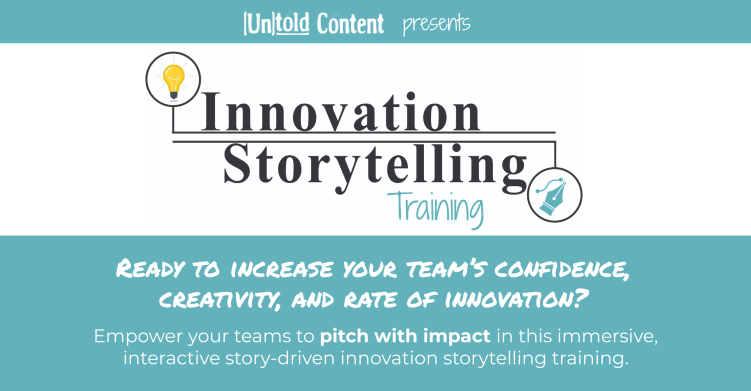
Katie: [00:28:05] One of the other guests on this podcast is the founder of Include Health, and he started his entire organization when he was in college, actually. And it was while he was working out at the gym and he saw someone in a wheelchair trying to use the weightlifting equipment and the struggles they were having to move from their wheelchair onto the equipment and to grab the handles where they were placed and grab the sort of the weight… Little keys. You know what I’m talking about? And it just completely transformed everything that he used to see the gym and how people use the gym. And he created a startup from it and really, that level of empathy, that level of observation and being willing to put others stories next to or in front of your own, sometimes I think it’s going to take us really, really far. There’s something else that’s really powerful about what you do at Women of Cincy that I think is relevant to the innovation community and it’s the power of reflection. There’s a lot of conversation now in innovation about how to be comfortable with failure and talk more about failure and be transparent about successes, what worked and what didn’t work. And I think that reflection is such a powerful way to go about making that kind of cultural change. And even if it starts at the level of sitting down and having your team members interview one another about the project and do it in a podcast style or do it in a blog article style, the way that Women of Cincy does, you know, our podcast, the way that we do it on this one. And I think that that’s a really powerful way to help change cultures. I’m thinking of my experience of being an interviewee with Women of Cincy. That hour was so valuable just in terms of getting my own thoughts out there and being able to connect on a deeper level with somebody who cared to listen to my story. How about you as a guest on a podcast? What are your thoughts on the power of reflection to help us create culture?
Chelsie: [00:30:13] Well, I think it’s huge. So we kind of have a joke that every year Women of Cincy like, reinvents itself. But I’m not kidding. So we’ve probably had these like three like really big shifts and we’re just over three years old now. And it’s because at the end of the year, we’ll sit down and we’ll talk through, like, OK, that didn’t work or OK. We need to do this better. OK. Like, we see this need in our community that isn’t being filled or. OK. You know what? We see this need, but that’s not our lane and we’re not the ones to do it. So we’re constantly just reimagining what we do and how we do it, what our content strategy is. I’ve got a phone call next week, it was supposed to be a big meeting, internally we’re gonna redo the way that our content schedule looks, which is huge for us. We’re all about content because we just want to keep doing it better. We just keep learning new things about how to operate. And we are, by the way, we are one hundred percent like volunteer-driven. I don’t get paid like everybody is a volunteer on Women of Cincy’s staff. Hopefully one day we have a small full time staff because there’s a lot of work to do. But so we are all volunteers coming together constantly. So we’ve got a lot of just like roles that are constantly changing just for the nature of volunteer work. We’ve got new perspectives that are always coming to the table, which is actually a good thing, and it forces us to stop and think about the way that we operate. Reflection has been huge for us. I think we’ve learned quite a few lessons, some of the biggest ones being that empathy is a muscle. So it’s important for us to come out over and over and over with new stories and new ways to engage with people, because empathy is a muscle if you don’t flex it, if you’re not fully engaged. I mean, you will kind of lose it. So empathy is a muscle we’ve got to keep coming nonstop. You know, we’ll never run out of stories. We’ll never run out of content. That’s a big piece of it. We are for profit, by the way. We changed to a nonprofit, which was a huge jump for us. But it was the right one for sure, that came out of, you know, just knowing that we’re stronger together and that there shouldn’t be one person driving the ship. I was the CEO. Now I’m the executive director. So I’ve kind of, you know, handed over the reins to our community to take this and run with it. We’ve just I don’t know. There’s a ton of them. I think another big one is it’s OK not to have all the answers. And we’re very up front with that. We always tell people in our newsletters that we’re learning. You talk about times that like maybe we said something and we were like, is that how we should have phrased it? Or someone said something and we want to apologize. I wouldn’t say apologize. We want to change the way that we speak about a certain topic from here on out, like we say all kinds of stuff publicly, because I think that it’s important to reflect and to own up to when you do make a mistake and to not be afraid of that. So, for instance, we noticed that. So I mentioned that all of our interviewees for feature stories are nomination driven. So our community is telling us who to interview and we noticed that we ran a whole batch of just like 30 to 40 year old white women in a row. And there was just no diversity. And it took us a minute. And we saw that happening and coming down the pipeline. And so basically, we just put out a letter to our community saying, like, hey, we’re learning how to do this. We’re trying to put things in place to make sure that things like this don’t happen again. We love all the stories that are coming out and we want to make sure we’re telling everybody’s stories. Here’s the three things you can do to help. You know, you can grab coffee with us and help us figure out how to better serve your community. You can nominate people on our site who have more diverse stories. You can invite us to an event. And we’ll just come connect with people that maybe don’t know that we exist. So we like to start putting out lists of ways that people can help us do this better. And so we do stuff like that all the time.
Katie: [00:34:15] I love what you said about empathy being a muscle that we need to practice. And that’s probably the most powerful way that we could possibly end this conversation is just to remind everyone listening that empathy is a muscle and you need to practice it and you need to expose yourself to stories from people who look different from yourself in order to test your assumptions about what will work and what won’t. So, Chelsie, I’m so grateful that you came on the podcast to talk about all of those things: empathy, storytelling, community building and mentoring. It’s all really just so important. And I know that all the work that you’ve created and that your community has – our community, I should say – has done to bring our stories to life, has really been a lifeline to me and an encouragement to me and so many others as we try to imagine new roles for our lives. So thank you so much for all of your work.
Chelsie: [00:35:09] Yeah, no problem. Thanks for listening. Appreciate it.
Katie: [00:35:12] Where can people find more about you and Women of Cincy?
Chelsie: [00:35:16] The best place to find us is at womenofcincy.org or you can also find us on Facebook, Instagram, Twitter and LinkedIn @womenofcincy.
Katie: [00:35:25] Awesome. Thanks so much.
Chelsie: [00:35:28] Thank you.
Katie: [00:35:28] Thanks for listening to this week’s episode. Be sure to follow us on social media and add your voice to the conversation. You can find us at Untold Content.
You can listen to more episodes of Untold Stories of Innovation Podcast.
*Interviews are not endorsements of individuals or businesses.
